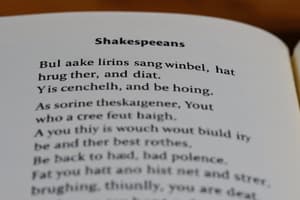Podcast
Questions and Answers
What does Shakespeare imply by stating that love is 'an ever-fixèd mark'?
What does Shakespeare imply by stating that love is 'an ever-fixèd mark'?
- Love can change when circumstances change.
- Love is dependent on physical beauty.
- Love is a guiding point that remains constant. (correct)
- Love is easily influenced by time.
How does Shakespeare describe the relationship between love and time?
How does Shakespeare describe the relationship between love and time?
- Love is bound by the limitations of time.
- Love grows stronger with age.
- Love experiences a decline as time progresses.
- Love is unaffected by the passage of time. (correct)
What metaphor does Shakespeare use to express the stability of love?
What metaphor does Shakespeare use to express the stability of love?
- An ever-fixèd mark. (correct)
- A wilting flower.
- A transient star.
- A stormy sea.
What might 'tempests' represent in Sonnet 116?
What might 'tempests' represent in Sonnet 116?
What does the phrase 'bears it out even to the edge of doom' suggest about love?
What does the phrase 'bears it out even to the edge of doom' suggest about love?
Which line indicates that true love does not change based on circumstances?
Which line indicates that true love does not change based on circumstances?
What is the significance of the phrase 'true minds' in the context of love?
What is the significance of the phrase 'true minds' in the context of love?
What literary device is primarily used in the line 'I never writ, nor no man ever lov’d'?
What literary device is primarily used in the line 'I never writ, nor no man ever lov’d'?
What does the speaker mean by 'admit impediments' in the context of love?
What does the speaker mean by 'admit impediments' in the context of love?
Which metaphor is used to describe love in quatrain 2?
Which metaphor is used to describe love in quatrain 2?
How does the speaker characterize love's relationship with time?
How does the speaker characterize love's relationship with time?
What does the speaker imply about the nature of love in the couplet?
What does the speaker imply about the nature of love in the couplet?
What theme is exemplified by the mention of Popoy and Basha?
What theme is exemplified by the mention of Popoy and Basha?
In what way does the speaker demonstrate self-denial regarding love?
In what way does the speaker demonstrate self-denial regarding love?
What significance is attached to the metaphor of stars in quatrain 2?
What significance is attached to the metaphor of stars in quatrain 2?
What is implied about love's durability in the face of adversity?
What is implied about love's durability in the face of adversity?
Flashcards are hidden until you start studying
Study Notes
Sonnet 116 by William Shakespeare
- The speaker in the Sonnet 116 by William Shakespeare argues that true love is permanent and unchanging, despite life’s impermanence
- The speaker refuses to admit impediments to love, declaring that true love does not alter when faced with change. It is constant and does not bend with the removal of a lover.
- Shakespeare’s Sonnet 116 is a poetic contemplation of love’s endurance, contrasting the ever-lasting nature of true love with the impermanence of the world around it.
- The sonnet states that love is an "ever-fixed mark" and "the star to every wand’ring bark," meaning it is a constant source of guidance and strength.
- The speaker asserts that true love is not susceptible to time, emphasizing that it remains unchanged even as physical beauty fades with age, represented by the “rosy lips and cheeks” that fall within Time’s “bending sickle’s compass.”
- The speaker confidently declares that if his argument about the unchanging nature of true love is incorrect, then he has never written, and no one has ever truly loved.
- The sonnet’s final lines are a bold statement that highlights the speaker’s unwavering belief in the permanence of love, even if it is a paradoxical concept in a world known for constant change.
Undermined Permanence
- The speaker’s insistence on love’s permanence in a world of impermanence creates a sense of internal conflict.
- It can be interpreted as a self-denial of the truth that love can change and evolve over time.
- This raises the question: Is the speaker trying to convince themselves or the reader of the enduring nature of true love?
- The sonnet’s final line suggests that love is an ideal – a concept that perhaps cannot be experienced in its purest, unchanging form.
- The sonnet can be interpreted as a defense of the idea of true love, despite its potential fragility in the face of life’s inevitable changes.
- The speaker’s relentless assertion stands as a testament to the enduring power of love as an ideal, even if the reality of love might be more complex and nuanced.
Impermanence of Love
- The sonnet subtly acknowledges the impermanence of love through metaphors such as “rosy lips and cheeks” fading within Time’s “bending sickle’s compass.”
- The sonnet highlights the duality of love: it simultaneously celebrates the enduring spirit of true love and acknowledges the reality of its potential change and loss.
- The speaker’s attempt to create a sense of permanence might ultimately reflect the human desire to find solace in the idea of a love that transcends the ever-changing nature of life.
- Sonnet 116 can serve as a reminder that love, even in its most profound forms, is a complex human experience that can be shaped by time, circumstance, and individual choices.
Studying That Suits You
Use AI to generate personalized quizzes and flashcards to suit your learning preferences.




